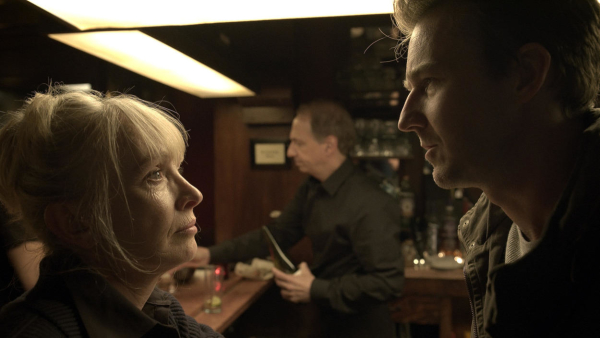Michael Coveney: Lindsay Duncan turns critic in Birdman as girls take over Unicorn
A new film set on Broadway is being tipped for Oscar glory

© Fox Searchlight Pictures
Lindsay Duncan opens next week on Broadway as the alcoholic Claire in Edward Albee's A Delicate Balance, challenging comparisons in the role with Elaine Stritch on Broadway and Maggie Smith in London. Bet she's hoping she doesn't incur the sort of critical wrath she displays most fearsomely in a brilliant new movie, Birdman, opening here soon and already tipped for Oscar glory.
Duncan plays Tabitha, a New York Times critic who sits in an actors' bar telling Michael Keaton – the lead character – that she's gonna kill his lousy play because he's a celebrity, not an actor, and how dare he presume he can act on a stage just because he's played a superhero in blockbuster movies.
Nothing rings remotely true about this critic, but it's not meant to. The whole movie, directed by Alejandro Gonzalez Inarritu, is a surreal take on Broadway theatre – the exterior locations are the St James's on 44th Street, right across the road from Phantom of the Opera and Matilda – celebrity and muddled, violent relationships as refracted through the play Keaton and the others (Edward Norton, Naomi Watts and Andrea Riseborough, all amazingly good) are rehearsing and performing, an adaptation of a brutal Raymond Carver story, What We Talk About When We Talk About Love.
Keaton's birdman – remember he was Tim Burton's Batman – is stalked by his celebrity film persona. He levitates, he poltergeists, he flies high over the theatre district. Most hilariously, he gets accidentally locked out of the theatre in his underpants and has to speed-walk through Times Square and back through the foyer to continue the performance, disrupting a drum parade and attracting a storm of selfies and twitters that sends the show viral, a marketing dream.
It's the most brilliant, metaphoric and stupendously original film about the theatre since Charlie Kaufman's Synecdoche, New York, in which Philip Seymour Hoffman played a theatre director hounded with as many demons and fantasies as Keaton is in this one. And the Times review for the Carver play? I won't spoil it for you, but the Birdman flies to a new level of stage realism as Lindsay Duncan's Tabitha rushes from her aisle seat to file a notice; and that's not something she'd ever do on Broadway, either, as critics there attend previews and stew in the play's juice for a few days. They really have so little to do, poor dears.
Unicorn gallops on as Realness comes to Hackney
On the too rare occasions when I catch up with community and educational projects on the professional fringe -that phrase in itself sends the wrong signals of worthiness and second-choice artistic endeavour – I am astonished by the high standard of work going on all over the country.
A play like Evan Placey's Girls Like That for the Synergy Theatre Project and the Unicorn, co-commissioned by the Birmingham Rep, the Theatre Royal, Plymouth, and the West Yorkshire Playhouse, is airing issues of feminism, self-esteem, peer group pressure and the dangers of the social media. And not just in conventional, consensual theatre situations, but in schools, prisons, re-hab centres – and currently at the Unicorn itself, where Purni Morell is rapidly erasing those meaningless, or at least arbitrary, demarcation lines between adult and children's theatre.
Girls Like That, very smartly directed by Esther Baker, shows what happens when a naked picture of the unseen 15 year-old Scarlett is posted on Facebook and goes viral, leading to a campaign of bullying, accusation and ostracism by a group of her close friends. Six actresses, four of them trained, one a university graduate, one a single mother whose "dark" life in drugs and criminality was turned round by working with Clean Break, deal with Scarlett's humiliation and their own changing relationships over a period of 40 years, from school to middle age, jump-cutting between their various reunions, birthday parties and outings.
It's as technically adroit and inflamed a piece as I've seen all year, funny and shockingly frank, and its target audience of school-age teenagers, some of them prisoners, ex-prisoners and "young people at risk of offending," is treated to something of obvious direct application to their own lives as well as a 75-minute slice of first class theatre.
While in this groove I must flag up another event coming to the Hackney Downs Studio – great place, when you find it, with workshops, big spaces, terrific bar/café – next week: a new musical, The Realness, directed by Maggie Norris of Big House, whose mission statement is simply to enable young people who have been in care to fulfil their potential. The last show of theirs I saw, Phoenix, featured a brilliant young performer, Jasmine Jobson, who now says she'd be in prison without the experience. Definitely: she was the most notorious tearaway on her manor.
The Realness, unsurprisingly, tells the tale of a young offender's journey from zero to hero. But with a promised score of rap, reggae, gospel and grime (the writers are Maureen Chadwick and Kath Gotts whose credits include Bad Girls: The Musical in the West End 2007), and the wild energy inevitably unleashed by Norris, I don't expect to be wishing I was in Memphis with Beverley Knight, or even Dagenham with Gemma Arterton.












